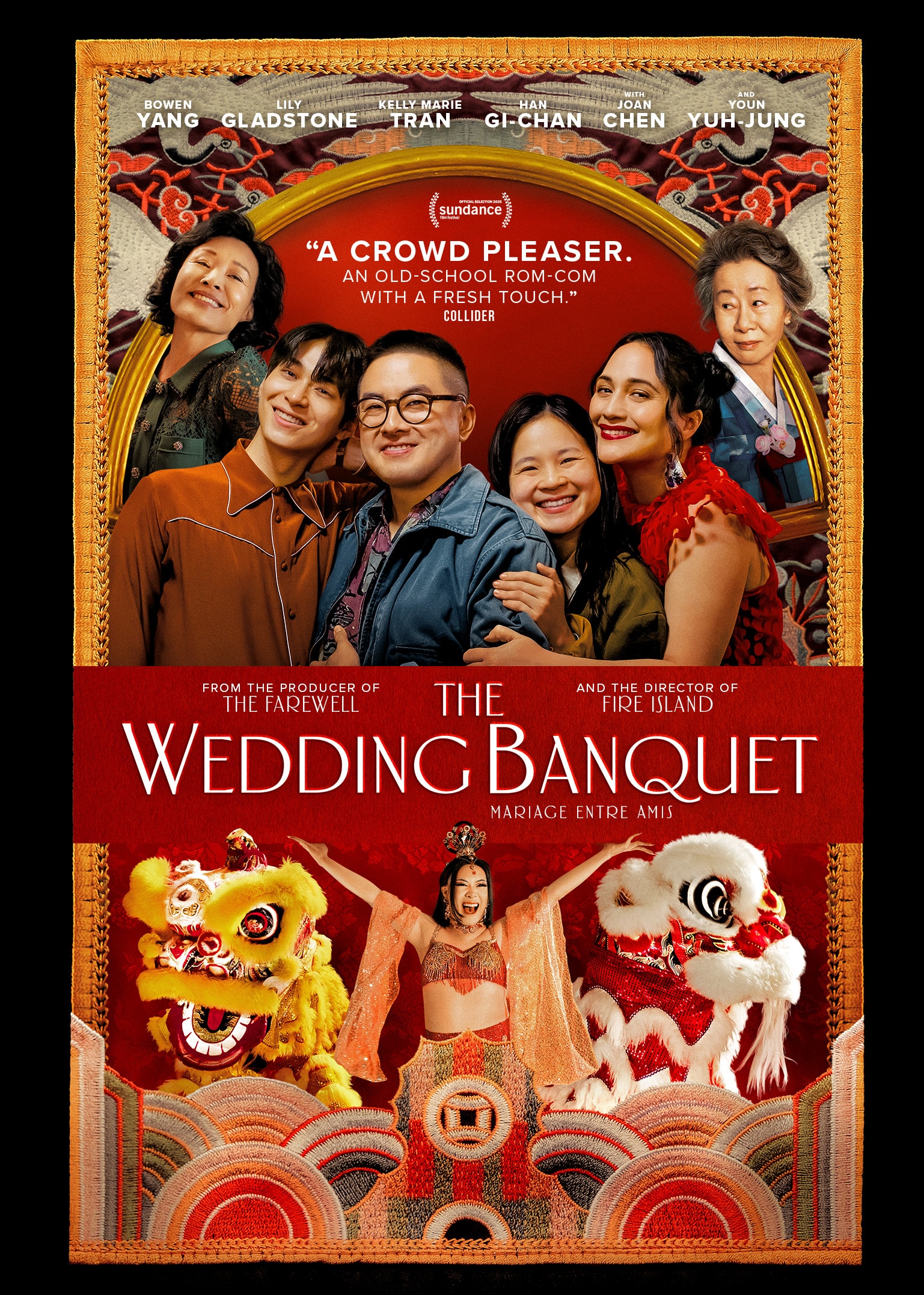
- Starring
- Bowen Yang, Lily Gladstone, Kelly Marie Tran
- Writers
- Andrew Ahn, James Schamus
- Director
- Andrew Ahn
- Rating
- 14A (Canada), R (United States)
- Running TIme
- 103 minutes
- Release Date
- April 18th, 2025
Overall Score
Rating Summary
A few years before he became a household name in Hollywood, Ang Lee made a global splash with The Wedding Banquet, a queer classic that earned an Oscar nomination for Best Foreign Language Film, won the Golden Bear at the Berlin Film Festival, and kickstarted Lee’s impressive career. Its success was a watershed moment in queer cinema, especially at a time when LGBTQ+ stories were often sidelined and homophobia was still deeply entrenched in global culture. More than 30 years later, Andrew Ahn, best known for his raunchy, sharply observed comedy Fire Island, reimagines Lee’s film for today’s audiences.
When Lee’s classic initially hit theatres, gay marriage was still widely illegal, something which played a big role in the film, being one of the primary reasons for why the characters had to stage a fake wedding. Ahn’s version is more rooted in contemporary issues, using the premise to explore queer relationships with a modern lens. In this update, Kelly Marie Tran and Lily Gladstone play Angela and Lee, a couple struggling with infertility who have run out of funds for IVF treatment. Living in their guest house are Angela’s longtime best friend Chris (Bowen Yang) and his boyfriend Min (Han Gi-Chan). When Min’s conservative grandmother pressures him to return to Korea and take over the family business, he hatches a plan to marry Angela for a green card, offering to pay for her IVF in return, as he comes from a wealthy background. With Chris unwilling to commit to marriage, Min still hiding his true self from his family, and Angela secretly dreading motherhood while Lee dreams of starting a family, the fake wedding becomes the catalyst that exposes the emotional fractures in each of their relationships.
While the original leaned into broad, farcical comedy, the remake shifts gears entirely. Here, Ahn opts for a more subdued and introspective tone, trading punchlines for quiet emotional resonance. Known for his sharp comedic touch in Fire Island, it is unexpected that his take on The Wedding Banquet feels more aligned with the tender subtlety of his breakthrough indie drama Driveways. It’s a thoughtful and admirable direction, one that clearly stems from Ahn’s deep empathy for his characters and a desire to explore their emotional complexities. However, It often feels caught between being a heartfelt character study and a joyous, fun celebration of the queer community. The zany setup calls for energy and playfulness, but the restrained direction sometimes undercuts the story’s inherent absurdity. The result is a film that struggles to land either as a raucous comedy or as a moving drama.
Gladstone emerges as the emotional anchor of the film, delivering a performance full of quiet strength. As Lee, she brings a much needed grounded presence to the film, portraying the heartbreak of fertility struggles with nuance and depth. In contrast, Tran and Yang, actors who might have shone brighter had the film leaned further into its comedic roots, struggle to find the emotional depth needed to fully convey Angela and Chris’ complexities. Their performances, along with Han’s, who leans solely into the comedy and doesn’t understand the tone Ahn is trying to achieve as Min, feel limited in range, which ultimately undercuts the emotional resonance the film so clearly strives for.
The most compelling characters are the ones pushed to the periphery. Joan Chen and Youn Yuh-Jung, both veterans with a sharp instinct for balancing comedy and drama, bring a much-needed texture to the film. Chen’s portrayal of Angela’s mother, May Chen, a mother who once disowned her daughter for being gay, only to later re-enter her life as a vocal LGBTQ advocate without ever offering a real apology, is a particularly fascinating take on a rarely-seen queer parent-child dynamic. It’s specific, complex, and deserving of way more screen time. Meanwhile, Youn Yuh-Jung steals scenes with her dry wit as Ja-Young, the grandmother who’s far sharper than anyone gives her credit for, continually defying expectations in fun ways.
In the end, Ahn’s reimagining of The Wedding Banquet is thoughtful and clearly crafted with care and affection for the original. It has moments that are genuinely moving and funny, and it reflects the evolution of queer storytelling in comparison to its predecessor. However, in its effort to merge the farcical origins of its premise with a more contemplative tone, the film often feels caught between two worlds, never quite comedic enough to be fun, nor emotionally potent enough to leave a lasting impression.
*still courtesy of Bleecker Street Media*
If you liked this, please read our other reviews here and don’t forget to follow us on Twitter or Instagram or like us on Facebook.

Discover more from
Subscribe to get the latest posts sent to your email.
